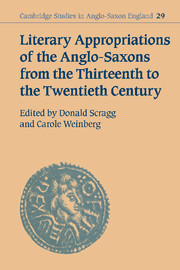Book contents
- Frontmatter
- Contents
- List of contributors
- Acknowledgements
- List of abbreviations
- Introduction. The Anglo-Saxons: fact and fiction
- 1 Victor and victim: a view of the Anglo-Saxon past in LaƷamon's Brut
- 2 Kings, constitution and crisis: ‘Robert of Gloucester’ and the Anglo-Saxon remedy
- 3 The South English Legendary: Anglo-Saxon saints and national identity
- 4 King Ælle and the conversion of the English: the development of a legend from Bede to Chaucer
- 5 Saxons versus Danes: the anonymous Edmund Ironside
- 6 New times and old stories: Middleton's Hengist
- 7 Crushing the convent and the dread Bastille: the Anglo-Saxons, revolution and gender in women's plays of the 1790s
- 8 Anglo-Saxon attitudes?: Alfred the Great and the Romantic national epic
- 9 ‘Utter indifference’?: the Anglo-Saxons in the nineteenth-century novel
- 10 The charge of the Saxon brigade: Tennyson's Battle of Brunanburh
- 11 Lady Godiva
- 12 The undeveloped image: Anglo-Saxon in popular consciousness from Turner to Tolkien
- Index of Anglo-Saxons mentioned in the text
- Index of authors and works cited
10 - The charge of the Saxon brigade: Tennyson's Battle of Brunanburh
Published online by Cambridge University Press: 21 September 2009
- Frontmatter
- Contents
- List of contributors
- Acknowledgements
- List of abbreviations
- Introduction. The Anglo-Saxons: fact and fiction
- 1 Victor and victim: a view of the Anglo-Saxon past in LaƷamon's Brut
- 2 Kings, constitution and crisis: ‘Robert of Gloucester’ and the Anglo-Saxon remedy
- 3 The South English Legendary: Anglo-Saxon saints and national identity
- 4 King Ælle and the conversion of the English: the development of a legend from Bede to Chaucer
- 5 Saxons versus Danes: the anonymous Edmund Ironside
- 6 New times and old stories: Middleton's Hengist
- 7 Crushing the convent and the dread Bastille: the Anglo-Saxons, revolution and gender in women's plays of the 1790s
- 8 Anglo-Saxon attitudes?: Alfred the Great and the Romantic national epic
- 9 ‘Utter indifference’?: the Anglo-Saxons in the nineteenth-century novel
- 10 The charge of the Saxon brigade: Tennyson's Battle of Brunanburh
- 11 Lady Godiva
- 12 The undeveloped image: Anglo-Saxon in popular consciousness from Turner to Tolkien
- Index of Anglo-Saxons mentioned in the text
- Index of authors and works cited
Summary
The first modern translation of Anglo-Saxon poetry with much claim to readability and poetic merit was Alfred Lord Tennyson's version of the Battle of Brunanburh, a poem from the Anglo-Saxon Chronicle for the year 937, celebrating a victory by West Saxons and Mercians over an alliance of Vikings from Dublin, Danes from the kingdom of York, Welshmen and Scots. Tennyson's translation was written probably in 1876 and was first published in 1880 in a volume called Ballads and Other Poems.
With its publication, familiarity on the part of general readers with Old English poetry must have expanded suddenly by a quantum leap. Tennyson was by then the famous Poet Laureate whose splendidly bewhiskered caricature in Punch was assumed to be recognizable without even needing an identifying label attached, a friend of Gladstone and of members of the royal family. His translation drew widespread attention for the first time to a body of poetry that up until then had scarcely been known except to a few scholars and philologists, whose translations, when they provided any, were pragmatic and likely to seem uncouth and repellent to the average reader.
Tennyson's version, based chiefly on a prose translation provided by his son Hallam, was praised at the time in reviews of the volume that contained it, and has been often praised since.
- Type
- Chapter
- Information
- Literary Appropriations of the Anglo-Saxons from the Thirteenth to the Twentieth Century , pp. 174 - 193Publisher: Cambridge University PressPrint publication year: 2000
- 3
- Cited by



